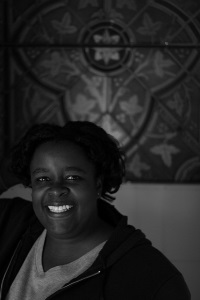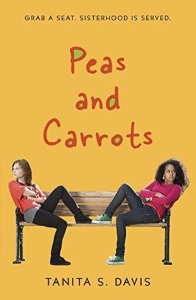2018 School Spending Survey Report
Five questions for Tanita S. Davis
Coretta Scott King Author Award honoree (for Mare's War in 2010; Knopf, 13–16 years) Tanita S.
 Photo: David T. Macknet.
Photo: David T. Macknet.Coretta Scott King Author Award honoree (for Mare's War in 2010; Knopf, 13–16 years) Tanita S. Davis's fourth novel, Peas and Carrots (Knopf, 13–16 years), is told through the alternating perspectives of prickly Dess, whose mother is in jail, and privileged Hope, whose family has fostered Dess's half-brother since he was a baby and is now caring for Dess. Issues of class, race (Dess is white, Hope and her family are black), family loyalty, and sibling rivalry are raised throughout, with no easy answers but satisfying food for thought.
1. Each of your YA novels is so different from the others in terms of setting, voice, issues faced by your protagonists. Do you usually start with a story or with the characters?
TD: I usually have a story I want to tell and a situation I want to explore. The characters almost grow out of the situation, then take it in hand and run with it.
2. In Peas and Carrots, did you write each girl's narrative one at a time? Or did you alternate, the way we're reading them in the book?
TD: I tend to write the story in alternating sections as I first approach it, then spend separate time with one character then the other, refining, checking that each of the voices is as distinct as it needs to be, and ensuring their individual narrative arcs hold together.
 3. The foster care system can get a bad rap in YA books. What made you want to focus on the positive?
3. The foster care system can get a bad rap in YA books. What made you want to focus on the positive?TD: Fostering was a family mission. I was a foster sister from the age of nine or ten to the age of twenty-four, when I got new "for-keeps" siblings. Many friends of my family are also foster families, and some of my students were foster children. I have seen evidence of both highly positive and deeply negative experiences with foster care, and I wanted to honor those people who are doing it well.
4. The Horn Book Magazine review [by Sarah Hannah Gómez] points out: "The book could easily be described as a touching story about different ways to make a family, but it's also a complex look at race, class, bodies, and the judgments people make." How did you balance this particular, complicated family story with a broader social commentary?
TD: Balancing story and social commentary isn't exactly a conscious effort. I'm not driven to Make a Statement in any book: I'm writing to tell a story, full stop. I am, however, fascinated by sociology; I am constantly drawn to observing people and their values, their attitudes, biases, and beliefs, and trying to make sense of them, as I'm sure every author, as well as every person, is, to a certain extent. All of us wonder why we act the ways that we do, in social, cultural, religious, gender, or ethnic groups, and what makes some things acceptable, and others so open to criticism or policing by others. The things I ponder in the wider world just naturally make their way into my stories, as my characters strive to "tell the true," as Jane Yolen puts it, about their lives.
5. Of course we love our children just the same — but did your heart go out especially to any of your characters?
TD: Growing up I had to share my mother with a great many other children, so my heart, in so many ways, goes out to Hope in Peas and Carrots. Throughout all my books, I think Octavia in Mare's War is the character with whom I empathize the most. She wants so badly to be bright and showy and extroverted like her grandmother Mare and like her sister Tali, to be someone she thinks Mare might admire, or that Tali might at least tolerate. But she has to accept that she is quiet, not a risk-taker, and often only seen as the "good kid" because she is too nervous to be bad. Still, there is something admirable and worthy and awesome about her — she just has to take her courage into her hands and dig a bit more to find and appreciate it. That takes heart and belief and work!
From the February 2016 issue of Notes from the Horn Book.
RELATED
RECOMMENDED
ALREADY A SUBSCRIBER? LOG IN
We are currently offering this content for free. Sign up now to activate your personal profile, where you can save articles for future viewing.






Add Comment :-
Comment Policy:
Comment should not be empty !!!
Elissa Gershowitz
Sheila, the Horn Book Magazine categorizes the book as Middle School/High School.Posted : Feb 11, 2016 03:44
Sheila Welch
I'm looking forward to reading this novel and also Davis's other books. I noticed the recommended age range and wonder if that was designated by the reviewer or the publisher. Either way, I like the decision to break the "rule" that books need to be distinctly for either YA or Middle Grade. So often a story, to be realistic, steps back and forth over that imaginary line between the two.Posted : Feb 11, 2016 05:01